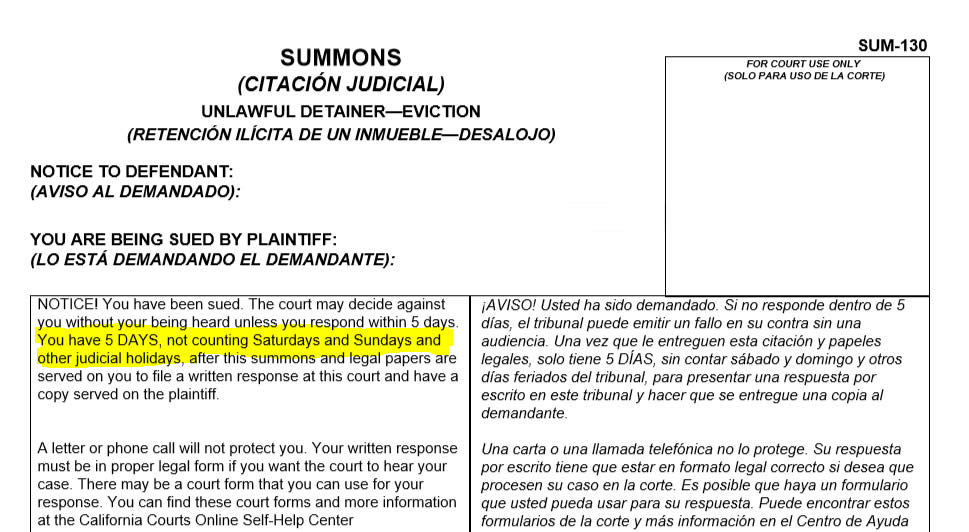New Procedures and Forms for California Unlawful Detainer Cases – 2021
New Procedures and Forms for California Unlawful Detainer Cases – September 1, 2020
PSI Thanks for a great Article
A new law was passed and immediately went into effect on September 1, 2020, entitled the COVID-19 Tenant Relief Act of 2020. The law will temporarily modify the initiating procedures for all unlawful detainer cases, and especially for non-payment of rent between March, 2020 through January 31, 2020. Process servers should be aware of these changes. The law relates to the impact of Covid-19 rent period from March 1, 2020 through January 31, 2021 and sunsets in 2025.
The intent of the law was to avoid an inevitable increase in homelessness as the pandemic continues to adversely affect the economy.
Generally, the law addresses two rental periods involving tenants who have not completely paid rent from March 1, 2020 through August 31, 2020 (pre-Sep. rent), and from September, 2020 through January 31, 2021 (post-Sep. 2020 rent).
Unpaid Rent from March 1, 2020 through August 31, 2020
The law required service, on or before September 30, 2020::
- A15-Day Notice for non-payment of pre-Sep. rent, designating the month(s) and amounts due. The law voids a three day notice for this purpose.
- Information regarding the new law.
- A blank declaration for the tenant to sign, under penalty of perjury, that the failure to pay rent was due to the financial impact of Covid-19.
Each tenant is obligated to sign and return the declaration under penalty of perjury regarding their inability to pay rent due to the financial impact of the Covid-19 pandemic. If the tenant returns the declaration no unlawful detainer action may be filed on the basis of non-payment of rent.
If the tenant does not return the declaration within 15 days of service, and an unlawful detainer is filed, the tenant may submit the declaration once the case is filed which will stay the proceeding.
“High Income Tenants” must provide the landlord proof of income and inability to pay.
If service was not made before September 30, 2020, and a lawsuit is filed later, the tenant may have an affirmative defense to the alleged obligation to pay the unpaid rent for that period. The Judicial Council will be adding that defense as a line item to the form Answer to Unlawful Detainer in the future.
Unpaid Rent from September 1, 2020 through January 31, 2021
The law requires service of:
- A15-Day Notice for non-payment of post-Sep. rent, designating the month(s) and amounts due. /this may involve multiple services throughout the five months for unpaid rent from September 1, 2020 through January 31, 2021. The law voids a three day notice.
- Information regarding the new law
- A blank declaration for the tenant to sign, under penalty of perjury, that the failure to pay rent was due to the financial impact of Covid-19
Each tenant is obligated to sign and return the declaration to the landlord within 15 days. If the tenant returns the declaration no unlawful detainer action may be filed on the basis of non-payment of rent.
If the tenant does not return the declaration, and an unlawful detainer is filed, the tenant may still submit the declaration once the case is filed which will stay the proceeding.
If the tenant returns the declaration, they must defer payment of 25% of the unpaid rent on or before January 31, 2021.
“High Income Tenants” must provide the landlord proof of income and inability to pay.
Manner of Service
The manner of service is still governed by CCP sec. 1161, Each tenant may personally served or sub-served or posted and mailed.
Proof of Service
The proof of service should separately and specifically list each document served
Note that the proof of service form developed by the California Apartment Association specifies that the follow-up mailing when sub-serving or posting, if necessary, was made on the same day of physical service. /that is not a legal requirement, but if that form is used, it should accurately reflect the date of mailing,
You may find a Proof of Service of a 15-Day Notice here under the Landlord / Tenant heading section.
Eviction Moratorias
The federal CARES Act, Center for Disease Control, and some local jurisdictions with eviction moratorium rules and regulations may restrict unlawful detainer filings before they expire.
Filing an Unlawful Detainer lawsuit for Possession Based Upon Unpaid Rent
TIn addition to the other required Civil Case Cover Sheets the court may require the landlord must also complete a new civil cover sheet, Plaintiff’s Mandatory Cover Sheet, and Supplemental Allegations—Unlawful Detainer for any unlawful detainer. The form requires assertions that they have complied with the new law before the court will file the unlawful detainer action.
Because the assertions are a statutory requirement, the Plaintiff’s Mandatory Cover Sheet and Supplemental Allegations must be served with the Summons and Complaint, and the defendant may assert affirmative defenses based upon the representations in the plaintiff’s form.
After January 31, 2021, if the deferred rent is not paid, an unlawful detainer for possession may then be filed on the basis of unpaid rent, presumably under the current law.
Filing a Case to Recover Unpaid Rent
The unpaid rent is converted to consumer debt, and may be recovered after March 1, 2021 in a separate lawsuit in small claims court. The new law removes the $10,000 jurisdictional limit specifically for Covid-19 related rent.
The impact on the Small Claims Courts around the state will likely be overwhelmed when these cases are being filed. They will likely need more staff, courtrooms, and judges to handle to increase in filings.
A box will be added to the Plaintiff’s Claim to Go to Small Claims Court form referencing the special lawsuit for the unpaid rent.
Evictions for unpaid rent may be filed starting October 5, 2020, for tenants that do not submit a financial distress declaration.
Unlawful Detainer Actions for Reasons Other than Unpaid Rent
- Eviction against nonresidential tenants
- Evictions for lease defaults stemming from reasons other than nonpayment of rent.
- Evictions for missed rent payments before March 2020
- Evictions for nonpayment of rent unrelated to the coronavirus pandemic.
- Evictions against tenants willfully damaging property.
- Evictions against tenants engaged in criminal activity.
- Evictions against tenants who violate the lease or rental agreement in other ways.
Of course, the timelines set forth, and procedures may not hold if the pandemic is not brought under control by January 2021. The legislature may modify or extend the protections during the first months of 2021.







 Professional tenants are a landlord’s worst nightmare, the ones you read about in the newspaper. These individuals are notorious for cheating the system and using loopholes, leaving landlord’s with lost rental income, a damaged property, and a huge headache. They will complain about the smallest of messes and become the largest hassles.
Professional tenants are a landlord’s worst nightmare, the ones you read about in the newspaper. These individuals are notorious for cheating the system and using loopholes, leaving landlord’s with lost rental income, a damaged property, and a huge headache. They will complain about the smallest of messes and become the largest hassles.









